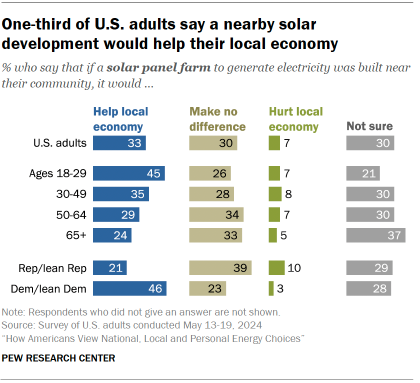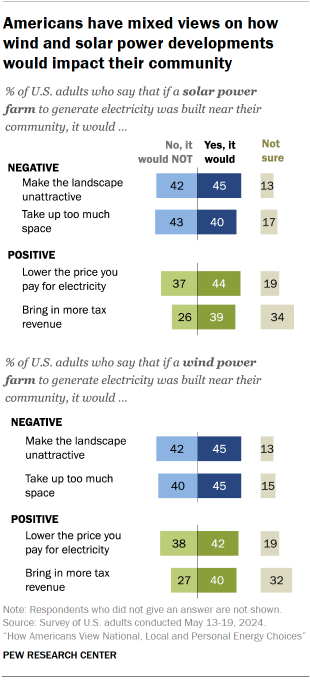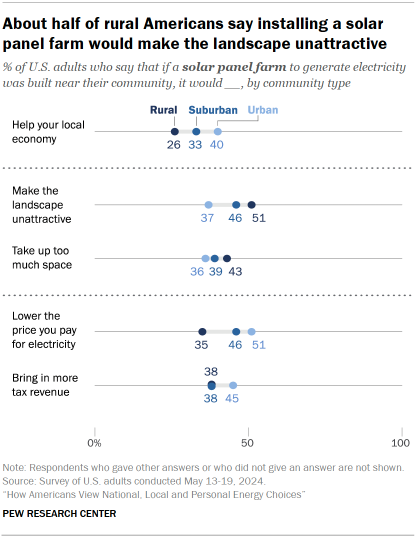Amid a major increase in renewable energy development across the country, some projects are facing resistance from local residents. In addition, there’s been a rise in the number of local regulations aimed at restricting or preventing renewable energy projects.

The Pew Research Center survey explores how Americans would feel about a wind or solar power development in their own community.
On balance, more think wind or solar development would help rather than hurt their local economy. But large shares think it would make no difference or are not sure. Respondents were asked to consider the prospect of wind and solar developments separately, but views on these two types of renewable energy development are very similar.
- When it comes to the installation of a solar panel farm in their community, 33% think this would help their local economy while just 7% think it would hurt it. A majority of Americans don’t see a clear positive or negative impact: 30% say it would make no difference and an identical share say they are not sure.
- Views of the local economic impact of a wind turbine farm are similar: 33% think it would help the local economy, compared with 9% who say this would hurt it. Another 27% say installing a wind turbine farm would make no difference and 31% are not sure.
Democrats are far more positive than Republicans about the local impact of solar and wind development, consistent with differences on renewable energy issues generally:
- Among Democrats and Democratic leaners, 46% say installing a solar panel farm in their community would improve their local economy, compared with just 3% who say this would hurt it. Another 23% think it would make no difference.
- In contrast, only 21% of Republicans and GOP leaners think a local solar development would help their local economy. Still, few Republicans (10%) think this type of development would hurt the local economy. The most common view is that it would make no difference (39%).
Younger adults are more likely than older adults to say that wind and solar developments in their community would help the local economy. For instance:
- 45% of U.S. adults under 30 think installing a solar panel farm in their community would help the local economy. Just 24% of those ages 65 and older say the same.
- Both Democrats and Republicans ages 18 to 29 are more likely than their older counterparts to say that wind and solar installments would have a positive effect on their local economy.

The survey also asked Americans to consider the local impact of wind and solar developments on things like the beauty of the landscape and utility bills. Overall, the public expresses fairly mixed sentiment across the examples asked about.
For instance, 45% of U.S. adults say that the installation of a solar panel farm in their area would definitely or probably make the landscape unattractive. Almost as many (42%) say it would not do this. Four-in-ten say a solar panel farm would take up too much space, while 43% say it would not.
On balance, more Americans think a local solar development would lower the price they pay for electricity than not (44% vs. 37%). Views tilt positive on the impact on tax revenue – though many say they’re not sure.
Opinions about the impact of wind power development follow the same general patterns as those for solar power.
Democrats hold more positive views than Republicans on the impact of local wind and solar development on tax revenue and utility prices.
Republicans are more likely than Democrats to expect that local wind and solar development will negatively impact the landscape and take up too much space.
For more details on these differences, refer to the Appendix.
Rural Americans’ views of local renewable energy development
For the U.S. to meet its goal of being carbon neutral by 2050, the country will have to vastly increase its solar and wind power developments, requiring millions of acres of land. Many of these wind and solar developments are expected to be in rural areas, where land is more available and cheaper.

Funding for renewable energy projects is already flowing into rural parts of the country. For example, the Biden administration in 2023 announced $11 billion of funding for renewable energy projects in rural communities. At the same time, many of the protests against wind and solar developments have happened in rural areas.
The survey finds that rural Americans have less positive views of wind and solar developments than Americans who live in urban or suburban areas.
- Rural Americans are less likely to say wind and solar developments would help their local economy. About a quarter of rural residents (26%) say a local solar development would help their local economy, compared with 33% of suburban residents and 40% of urban residents.
- Rural residents are more likely to expect negative outcomes from local wind and solar development: About half say that a solar panel farm in their community would make the landscape ugly. By contrast, 37% of urban Americans say this.
- Rural Americans are less likely to expect positive consequences from renewable energy development. For example, 35% of rural residents say a local solar panel farm would lower the price they pay for electricity, compared with 51% of urban residents.
Rural Americans are more likely to lean toward or identify with the Republican Party than Americans who live in suburban or urban areas. Still, there are some differences in views among Republicans, with rural Republicans tending to be more critical of renewable energy developments than Republicans living in urban areas.




